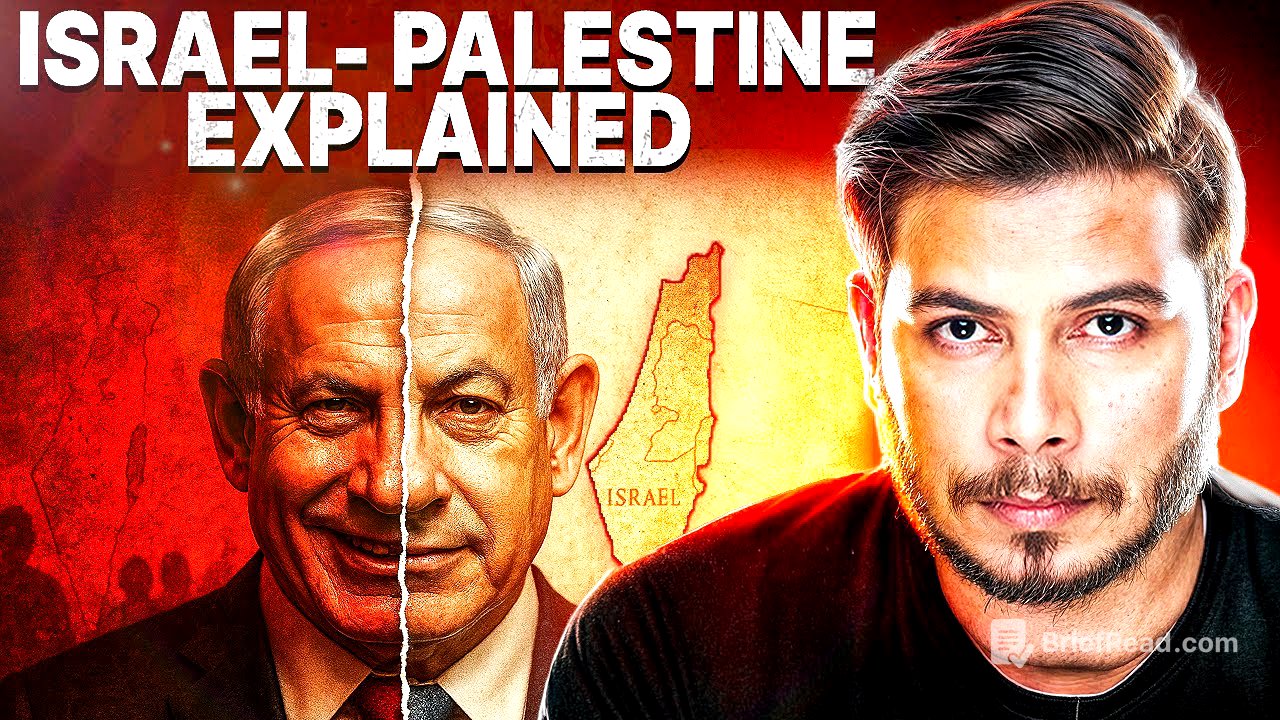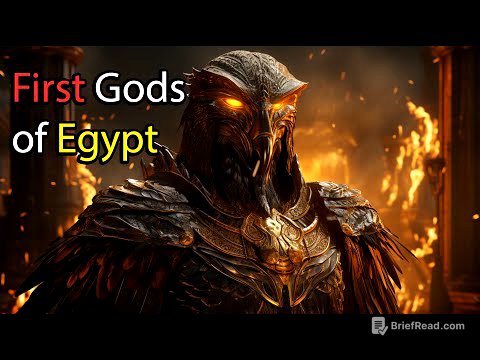TLDR;
This video provides a detailed historical overview of the Israel-Palestine conflict, starting from ancient times to the present day. It explores the religious significance of Jerusalem for Jews, Christians, and Muslims, and how this significance has fuelled conflict for centuries. The video examines the rise of Zionism, the Balfour Declaration, the impact of World War II, and the creation of the state of Israel. It also discusses key events such as the Suez Canal Crisis, the Six-Day War, the emergence of the PLO and Hamas, and India's evolving stance on the conflict.
- Jerusalem's religious importance to Judaism, Christianity and Islam is a key factor in the conflict.
- The video traces the historical events and political developments that led to the creation of Israel and the displacement of Palestinians.
- The roles of Britain, the United Nations, and various Arab nations in the conflict are examined.
- The emergence and impact of organisations like the PLO and Hamas are discussed.
- India's evolving stance on the conflict, from initial support for Palestine to a more balanced approach, is explored.
Introduction: The Core of the Conflict [0:00]
The video introduces the complex and long-standing conflict in the region encompassing Israel and Palestine, highlighting Jerusalem as the central point of contention among Christians, Jews, and Muslims. It mentions key entities and locations frequently associated with the conflict, such as the Gaza Strip, Hamas, Temple Mount, and West Bank, and poses the question of why a lasting solution has remained elusive despite international efforts. The video also questions what gives Israel the strength to defeat all Arab nations.
Ancient Roots: Kingdom of Israel and the Temple Mount [1:48]
The history of the region is traced back to 1047 B.C. with the "Kingdom of Israel" ruled by King Solomon, with Jerusalem as its capital. King Solomon constructed the First Temple of the Jews, known as the Temple Mount, a central place of worship. The Babylonians demolished this temple in 586 B.C., after which the Persians reconstructed it, renaming it the Second Temple. The Roman Empire then destroyed the Second Temple, leaving only the Western Wall. This destruction led to the migration of Jews to Europe, and it was during this period that Jesus Christ was born into a Jewish family.
Religious Shifts: Christianity and the Arab Conquest [2:32]
Jesus Christ, born a Jew, began his own teachings, leading to the rise of Christianity. His crucifixion in Jerusalem by Jews led to negative sentiments towards Jews. In 306 AD, Roman King Constantine the Great adopted Christianity, leading to its spread throughout the Roman Empire but also increasing hatred towards Jews, resulting in their torture, killings, and further migration. Constantine built the Church of the Holy Sepulchre at the site of Jesus' crucifixion. In 638 AD, the Arab Army of Umar conquered the area, constructing the Dome of the Rock and the Al Aqsa Mosque on the Temple Mount, which Muslims refer to as Haram Al Shareef.
Jerusalem's Significance and Jewish Migration [5:15]
Jerusalem holds immense importance for Jews, Christians, and Muslims, making it a focal point of conflict. Jews migrated worldwide, especially to Europe, while maintaining their connection to Jerusalem through prayer. In 1891, as Arabs took control of the Jews' kingdom area, Jews across the world yearned to return to their original land. Jewish writer Leon Pinsker's book "Auto-Emancipation" advocated for an independent Jewish state due to the discrimination faced in Europe. This marked the beginning of the Zionist movement, aimed at reclaiming their original land.
World War I and the Balfour Declaration [6:33]
During World War I, with Germany and Britain on opposing sides and the Ottoman Empire (ruling the "Kingdom of Jews") siding with Germany, Britain sought allies. Believing that Jews in Russia and America could influence their governments, Britain supported the Zionist cause, promising to help establish a national home for the Jewish people in Palestine through the "Balfour Declaration". After Britain won World War I in 1918, they removed the Ottoman Empire from power and began to assist Jews in Europe to settle in Palestine.
Growing Tensions: Jewish Immigration and Arab Opposition [8:01]
Despite the larger Arab population in Palestine, Jews began settling there with British support. Arab countries opposed this migration. Jewish organisations funded land purchases in Palestine, increasing the Jewish population from 25,000 in 1878 to 85,000 by 1914. British "Divide and Rule" strategy exacerbated tensions, as they facilitated Jewish immigration while assuring Arabs of their commitment to peace.
World War II and the Holocaust [9:36]
Between 1933 and 1936, 0.17 million Jews migrated to Palestine due to the rise of Hitler and increasing persecution in Europe. Anti-Semitism, rooted in the blame for Jesus' death and economic factors, led to discrimination, violence, and the Nuremberg Laws, stripping Jews of their rights and citizenship. The Holocaust during World War II, in which 6 million Jews were killed, intensified the urgency for Jews to return to Palestine.
The United Nations Partition Plan [10:44]
During World War II, Jews supported Britain, the US, and the USSR against Hitler. After the war, the formation of the United Nations aimed to prevent future conflicts. Due to the support Jews had given to the allied powers, the UN was expected to reward them by helping them regain their country. Britain presented the Balfour Declaration to the UN, and in 1947, the UN formed a special committee to address the issue of Palestine. The committee proposed partitioning Palestine into separate Jewish and Arab states, with Jerusalem under UN control.
The Creation of Israel and the Arab-Israeli War [13:45]
In 1947, the UN approved the partition plan despite opposition from Arab countries and India. The UN released a map outlining the proposed division, which allocated significant territory to Israel even in areas with minimal Jewish population. Arabs rejected the partition, but Jews accepted it. After the British withdrew, Arab countries launched a war against Israel in 1948, but Israel won and seized more land than initially allocated by the UN.
The Law of Return and the Suez Canal Crisis [15:27]
In 1950, Israel passed the "Law of Return," granting citizenship to any Jew worldwide. The Suez Canal, built by France and Egypt but later controlled by France and the UK, became strategically important. In 1956, Egyptian leader Nasser nationalised the canal and blocked Israeli access, leading to a war involving Israel, the UK, and France against Egypt. The UN intervened in 1957, resulting in Israel's withdrawal after securing a written agreement guaranteeing its access to the canal.
The Palestine Liberation Organization (PLO) and the Six-Day War [17:21]
In 1964, Arab countries formed the Palestine Liberation Organization (PLO) to reclaim Palestine from Israel. In 1967, Egyptian leader Nasser blocked the Strait of Tiran, used by Israel for exports, leading to the Six-Day War. Israel launched a surprise attack and defeated the Arab countries in just six days, capturing the Gaza Strip, West Bank, and other territories. The UN again intervened, returning some areas to Egypt, but other parts remained under Israeli control.
The PLO Under Yasser Arafat and the Rise of Hamas [18:24]
In 1969, Yasser Arafat became the chairman of the PLO, leading to increased attacks on Israel. Arab countries used oil as a political weapon, restricting supply to countries maintaining relations with Israel. The PLO resorted to tactics such as hijacking planes. In the 1972 Olympics, Palestinian militants attacked Israeli athletes. By 1988, the PLO had accepted the two-state model, but Israel was unwilling to concede land. The Oslo Accord in 1993 granted Palestine control over Gaza Strip and West Bank, with Yasser Arafat as president. However, Israel's failure to honour the agreement led to the emergence of Hamas, a radical Palestinian organisation.
The Current Situation and India's Stand [21:39]
The conflict continues with frequent attacks between Hamas and Israel. The question of who controls Jerusalem and who gets their land back remains unresolved. India's stance on the conflict has been mixed, initially supporting Palestine but later recognising Israel. India has maintained diplomatic relations with both the PLO and Israel. Mahatma Gandhi's quote reflects India's historical support for the Palestinian cause. Since 2014, India has often abstained from UN votes related to the conflict.









